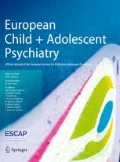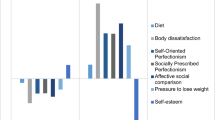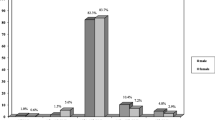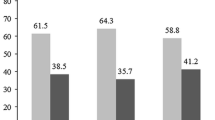Abstract
Objective
To identify disordered eating behaviour and attitudes in a large representative population in order to determine the relationship with body weight status, and to assess associated psychopathology and health-related quality of life.
Methods
A total of 11–17 year-old adolescents (n = 1,895) were randomly selected from the national representative sample of 17,641 families participating in the German Health Interview and Examination Survey for Children and Adolescents (KiGGS). Weight and height were assessed by trained staff. Mental health problems and health-related quality of life were examined by means of a telephone interview and different questionnaires. Eating disordered behaviour and attitudes were identified by the SCOFF, an instrument consisting of five questions originally developed to screen for eating disorders in clinical settings.
Results
About one third of the girls and 15% of the boys reported disordered eating behaviour and attitudes, which were most prevalent in overweight youth. There was a significant association between the presence of disordered eating behaviour and psychopathology, which was comprised of internalising and externalising behavioural problems. In addition, adolescents with disordered eating behaviour reported reduced quality of life.
Conclusion
The high prevalence of disordered eating in the general population of Germany is of great concern. Health professionals should not only be aware of disordered eating in underweight adolescents, but in all youth, especially overweight individuals. Disordered eating behaviour is associated with a wide range of psychopathological and psychosocial concerns. Thus, youngsters engaging in disordered eating behaviour should also be explored for other serious mental or social problems.

Similar content being viewed by others
References
Achenbach TM, Edelbrock C (1983) Manual for the child behaviour checklist/4–18 and revised child behaviour profile. University of Vermont, Department of Psychiatry, Burlington
Achenbach TM (1991) Manual for the child behaviour checklist/4–18 and 1991 profile. University of Vermont, Department of Psychiatry, Burlington
Arbeitsgruppe Deutsche Child Behaviour Checklist (1998) Elternfragebogen über das Verhalten von Kindern und Jugendlichen; deutsche Bearbeitung der Child Behaviour Checklist (CBCL/4–18). Einführung und Anleitung zur Handauswertung, 2nd edn with German norms. Arbeitsgruppe Kinder-, Jugend- und Familiendiagnostik, Köln
Aschenbrenner K, Aschenbrenner F, Kirchmann H, Strauß B (2004) Störungen des Essverhaltens bei Gymnasiasten und Studenten. Psychother Psychosom Med Psychol 6:259–263
Berger U, Schilke C, Strauss B (2005) Weight concerns and dieting among 8 to 12-year-old children. Psychother Psychosom Med Psychol 55:331–338
Birmaher B, Brent DA, Chiappetta L, Bridge Monga S, Baugher M (1999) psychometric properties of the screen for child anxiety related emotional disorders (SCARED): a replication study. J Am Acad Child Adolesc Psychiatry 38:1230–1236
Braet C, Mervielde I, Vandereyken W (1997) Psychological aspects of childhood obesity: a controlled study in a clinical and nonclinical sample. J Pediatr Psychol 22:59–71
Britz B, Siegfried M, Ziegler A, Lamertz C, Herpertz-Dahlmann B, Remschmidt H, Wittchen HJ, Hebebrand J (2000) Rates of psychiatric disorders in a clinical study group of adolescents with extreme obesity and in obese adolescents ascertained via a population based study. Int J Obes 24:1707–1714
Cohen J (1988) Statistical Power Analysis for the Behavioural Sciences. 2nd ed. Lawrence Erlbaum Associates, Inc., Hillsdale
Croll J, Neumark-Sztainer D, Story M, Ireland M (2002) Prevalence and risk and protective factors related to disordered eating behaviours among adolescents: relationship to gender and ethnicity. J Adolesc Health 31:166–175
Datar A, Sturm R (2004) Childhood overweight and parent- and teacher-reported behaviour problems. Arch Pediatr Adolesc Med 154:804–810
Ebbeling CB, Pawlak DB, Ludwig DS (2002) Childhood obesity: public health crisis, common sense cure. Lancet 360:473–482
Faulstich ME, Carey MP, Ruggiero L, Enyart P, Gresham F (1986) Assessment of depression in childhood and adolescence: an evaluation of the Center for Epidemiological Studies Depression Scale for Children (CESDC). Am J Psychiatry 143:1024–1027
Fendrich M, Weissman MM, Warner V (1990) Screening for depressive disorder in children and adolescents: validating the Center for epidemiological studies depression scale for children. Am J Epidemiol 131:538–551
Fredriks AM, van Buuren S, Wit JM, Verloove-Vanhorick PS (2000) Body index measurements in 1996–1997 compared with 1980. Arch Dis Child 82:107–112
Fulkerson JA, Sherwood NE, Perry CL, Neumark-Sztainer D, Story M (2004) Depressive symptoms and adolescents eating and health behaviours: a multifaceted view in a population-based sample. Prev Med 38:865–875
Goodman R (1997) The strengths and difficulties questionnaire: a research note. J Child Psychol Psychiatry 38:581–586
Goodman R (1999) The extended version of the strengths and difficulties questionnaire as a guide to child psychiatric caseness and consequent burden. J Child Psychol Psychiatry 40:791–799
Herpertz-Dahlmann B, Geller F, Böhle C, Khalil C, Trost-Brinkhues G, Ziegler A, Hebebrand J (2003) Secular trends in body mass index measurements in preschool children from the City of Aachen, Germany. Eur J Pediatr 162:104–109
Hoek HW (2006) Incidence, prevalence and mortality of anorexia nervosa and other eating disorders. Curr Opin Psychiatry 19:389–394
Hölling H, Schlack R (2007) Essstörungen im Kindes- und Jugendalter. Erste Ergebnisse aus dem Kinder- und Jugendgesundheitssurvey (KiGGS). Bundesgesundheitsbl Gesundheitsforsch Gesundheitsschutz 50:794–799
Holtkamp K, Konrad K, Müller B, Heussen N, Herpertz S, Herpertz-Dahlmann B, Hebebrand J (2004) Overweight and obesity in children with attention-deficit/hyperactivity disorder. Int J Obes Relat Metab Disord 28:685–689
Kamtsiuris P, Lange M, Schaffrath Rosario A (2007) The German Health Interview and Examination Survey for Children and Adolescents (KiGGS): Sample design, response and nonresponse analysis. Bundesgesundheitsbl Gesundheitsforsch- Gesundheitsschutz 50:547–556
Kovacs M (1985) The children’s depression inventory (CDI). Psychopharmacol Bull 21:995–999
Kovacs M (1989) Affective disorders in children and adolescents. Am Psychol 44:209–215
Kromeyer-Hauschild K, Wabitsch M, Kunze D, Geller F, Geiß HC, Hesse V, von Hippel A, Jaeger U, Johnson D, Korte W, Menner K, Müller G, Müller JM, Niemanns-Pilatus A, Remer T, Schaefer F, Wittchen HU, Zabransky S, Zellner K, Ziegler A, Hebebrand J (2001) Perzentile für den Body-mass-Index für das Kindes- und Jugendalter unter Heranziehung verschiedener deutscher Stichproben. Monatsschr Kinderheilkd 149:807–818
Lamertz CM, Jacobi C, Yassouridis A, Arnold K, Henkel AW (2002) Are obese adolescents and young adults at higher risk for mental disorders. A community survey. Obes Res 10:1152–1160
Lamerz A, Kuepper-Nybelen J, Bruning N, Wehle C, Trost-Brinkhues G, Brenner H, Hebebrand J, Herpertz-Dahlmann B (2005) Prevalence of obesity, binge eating, and night eating in a cross-sectional field survey of 6-year-old children and their parents in a German urban population. J Child Psychol Psychiatry 46:385–393
Latner JD, Stunkard AJ (2003) Getting worse: The stigmatization of obese children. Obes Res 11:452–456
Luck AJ, Morgan JF, Reid F, O’Brien A, Brunton J, Price C, Perry L, Lacey JH (2002) The SCOFF questionnaire and clinical interview for eating disorders in general practice: comparative study. BMJ 325:755–756
Lumeng JC, Gannon K, Cabral HJ, Frank DA, Zuckermann B (2003) Association between clinically meaningful behaviour problems and overweight in children. Pediatrics 112:1138–1145
Lundstedt G, Edlund B, Engström I, Thurfjell B, Marcus C (2006) Eating disorder traits in obese children and adolescents. Eat Weight Disord 11:45–50
Marmorstein NR, von Ranson KM, Iacono WG, Succop PA (2007) Longitudinal associations between externalizing behaviour and disordered eating attitudes and behaviours: a community-based study. J Clin Child Adolesc Psychol 36:87–94
Morgan JF, Reid F, Lacey JH (1999) The SCOFF questionnaire: assessment of a new screening tool for eating disorders. BMJ 319:1467–1468
Mustillo S, Worthman C, Erkanli A, Keeler G, Angold A, Costello E (2003) Obesity and psychiatric disorder: developmental trajectories. Pediatrics 111:851–859
Neumark-Sztainer D, Paxton SJ, Hannan PJ, Haines J, Story M (2006) Does body satisfaction matter? Five-year longitudinal associations between body satisfaction and health behaviours in adolescent females and males. J Adolesc Health 39:244–251
Neumark-Sztainer D, Hannan J (2000) Weight-related behaviours among adolescent girls and boys. Arch Pediatr Adolesc Med 54:569–577
Poskitt EME (1995) Defining childhood obesity: the relative body mass index (BMI). Acta Paediatr 84:961–963
Ravens-Sieberer U (2003) Der Kindl-R Fragebogen zur Erfassung der gesundheitsbezogenen Lebensqualität bei Kindern und Jugendlichen - Revidierte Form. In: Schumacher J, Klaiberg A, Brähler E (eds) Diagnostische Verfahren zu Lebensqualität und Wohlbefinden. Göttingen, Hogrefe, pp 184–188
Ravens-Sieberer U, Bettge S, Erhart M (2003) Lebensqualität von Kindern und Jugendlichen - Ergebnisse aus der Pilotphase des Kinder- und Jugendgesundheitssurveys. Bundesgesundheitsbl Gesundheitsforsch Gesundheitsschutz 46:340–345
Ravens-Sieberer U, Kurth B-M, KiGGS study, BELLA study group (2008) The mental health module (BELLA study) within the German Health Interview and Examination Survey of Children and Adolescents (KiGGS): study design and methods. Eur Child Adolesc Psychiatry 17(Suppl1):10–21
Ravens-Sieberer U, Wille N, Erhart M, Bettge S, Wittchen H-U, Rothenberger A, Herpertz-Dahlmann B, Resch F, Hölling H, Bullinger M, Barkmann C, Schulte-Markwort M, Döpfner M as the BELLA study group (2008). Prevalence of mental health problems among children and adolescents in Germany: results of the BELLA study within the National Health Interview and Examination Survey. Eur Child Adolesc Psychiatry 17(Suppl1):22–33
Rueda GE, Diaz LA, Campo A, Barros JA, Avila GC, Orostegui LT, Osorio BC, Cadena Ldel P (2005) Validation of the SCOFF questionnaire for screening of eating disorders in university women. Biomedica 25:196–202
Rueda GE, Diaz LA, Ortiz DP, Pinzon C, Rodriguez J, Cadena LP (2005) Validation of the SCOFF questionnaire for screening the eating behaviour disorders of adolescents in school. Aten Primaria 15:89–94
Schwimmer JB, Burwinkle TM, Varni JW (2003) Health-related quality of life of severely obese children and adolescents. JAMA 289:1813–1819
Stice E, Cameron RP, Killen JD, Hayward C, Taylor CB (1999) Naturalistic weight-reduction efforts prospectively predict growth in relative weight and onset of obesity among female adolescents. J Consult Clin Psychol 67:967–974
Stice E, Presnell K, Spangler D (2002) Risk factors for binge eating onset in adolescent girls: a 2-year prospective investigation. Health Psychol 21:131–138
Stiensmeier-Pelster J, Schürmann M, Duda K (2000) DIKJ. Depressions-Inventar für Kinder und Jugendliche. Handanweisung, 2nd edn. Hogrefe, Göttingen
Tanofsky-Kraff M, Yanovski SZ, Wilfley DE, Marmarosh C, Morgan CM, Yanovski JA (2004) Eating-disordered behaviours, body fat, and psychopathology in overweight and normal-weight children. J Consult Clin Psychology 72:53–61
Teagle SE (2002) Parental problem recognition and child mental health service use. Mental Health Serv Res 4:257
Toselli AL, Villani S, Ferro AM, Verri A, Cucurullo L, Marinoni A (2005) Eating disorders and their correlates in high school adolescents of Northern Italy. Epidemiol Psichiatr Soc 14:91–99
Vander Wal JS, Thelen MH (2000) Eating and body image concerns among obese and average-weight children. Addict Behav 25:775–778
Vila G, Zipper E, Darbas M, Bertrand C, Robert JJ, Ricour C, Mouren-Simeoni MC (2004) Mental disorders in obese children and adolecents. Psychosom Med 66:387–394
Weissman MM, Orvaschel H, Padian N (1980) Children’s symptom and social functioning self-report scales. Comparison of mothers’ and children’s reports. J Nerv Ment Dis 168:736–740
Williams J, Wake M, Hesketh K, Maher E, Waters E (2005) Health-related quality of life of overweight and obese children. JAMA 293:70–76
Conflict of interest
All authors declare no conflict of interest.
Author information
Authors and Affiliations
Consortia
Corresponding author
Additional information
Members of the BELLA study group: Ulrike Ravens-Sieberer (Principal Investigator), Claus Barkmann, Susanne Bettge, Monika Bullinger, Manfred Döpfner, Michael Erhart, Beate Herpertz-Dahlmann, Heike Hölling, Franz Resch, Aribert Rothenberger, Michael Schulte-Markwort, Nora Wille, Hans-Ulrich Wittchen.
Rights and permissions
About this article
Cite this article
Herpertz-Dahlmann, B., Wille, N., Hölling, H. et al. Disordered eating behaviour and attitudes, associated psychopathology and health-related quality of life: results of the BELLA study. Eur Child Adolesc Psychiatry 17 (Suppl 1), 82–91 (2008). https://doi.org/10.1007/s00787-008-1009-9
Published:
Issue Date:
DOI: https://doi.org/10.1007/s00787-008-1009-9




